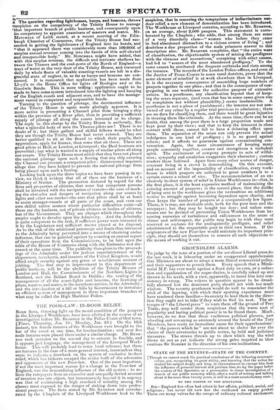THE POOR-LAW: IN-DOOR RELIEF.
SOME facts, throwing light on the moral condition of the paupers in the Liverpool Workhouse, have been elicited in the course of an investigation before Mr. Rusirrost in the Police Court of that town. (Times, Thursday, Jan. 19; Monday, Jan. 23.) On the 16th instant, ten female inmates of the Workhouse were brought to the bar of the court at one time, for insubordination ; and next five male inmates were placed there under a similar charge. Mr. Rusn- TON took occasion on the second day to censure in forcible, and it appears just language, the management of the Liverpool Work- house. This will probably lead to some local reforms; but there are features in the case of a more general interest, inasmuch as they seem to indicate a drawback on the system of exclusive in-door relief, which has hitherto escaped the notice both of the advocates and opponents of the new Poor-law. One of the most important, if not the most important reason or a change in the Poor-law of England, was the demoralizing influence of the old system : to re- lieve the ratepayers from an excessive and unequally-levied amount of taxation was one object, but immeasurably beyond it in urgency was that of maintaining a high standard of morality among the classes most exposed to the danger of sinking down into profes- sional paupers. The facts stated by Mr. Rusierois and corrobo- rated by the Chaplain of the Liverpool Workhouse lead to the
suspicion, that in removing the temptations of indiscriminate out- door relief, a new element of demoralization has been introduced.
The Workhouse at Liverpool contains, according to Mr. RUSHTON, on an average, about 2,000 paupers. This statement is corro- borated by the Chaplain ; who adds, that among them are some of a very disorderly class—" women who before they came in had abandoned themselves to a vicious course of living "; and
doubtless a due proportion of the male prisoners answer to this description also. Mr. RUSHTON complains, that "the entire want of classification, the objectionable system of mixing the profligates
with the virtuous and necessitous," conspiring with other causes, had led to "scenes of the most abandoned profligacy." To the same causes be attributed the frequent outbreaks and riots among the inmates. The records of the London Police-offices, and even of the Justice of Peace Courts in some rural districts, prove that the same element of mischief is at work elsewhere than in Liverpool. It is the necessary consequence of assembling large numbers of paupers together in one place; and that is the consequence of con- gregating in one workhouse the collective paupers of extensive unions. In a poorhouse, any classification beyond that of keep- ing the sexes separate, (and even that has in some cases given rise to complaints not without plausibility,) seems inadmissible. A poorhouse is not a place of punishment ; the inmates are not con- victed of any crime by a regular trial previous to admission ; there are no data for classify ing them, and there would be great injustice in treating them like criminals. At the same time, there can be no doubt, that among the poor there is a large proportion made and kept poor by their vices ; and that to keep the innocent in close contact with those, cannot fail to have a debasing effect upon them. The separation of the sexes can only prevent the actual indulgence in one kind of profligacy ; it is no guard against others; and it affords no guarantee against contaminating con- versation. Again, the mere circumstance of keeping many people constantly together, creates and strengthens a turbulent spirit. The excitement of company prompts to acts of wilful- ness; sympathy and emulation exaggerate their character ; custom renders them habitual. Apart from every other source of danger, constant living in a crowd is demoralizing On this account, and on account of the impossibility of classification, every work- house in which paupers are collected in great numbers is to a certain extent a school of vice. The recommendation of an ex- clusively in-door system of relief in Union Workhouses is—that, in the first place, it is the least expensive method of maintaining the existing amount of paupers: in the second place, that the dislike of being sent to the workhouse gives the necessitous an additional motive to struggle against becoming dependent upon charity, and thus keeps the number of paupers at a comparatively low figure. These, it is true, are desirable ends, both for the poor man and the ratepayer ; but they may be bought too dear ; and unless some means can be devised of preventing Union Workhouses from be- coming nurseries of turbulence and callousness to the sense of shame and self-respect, the public may begin to wish they were reserved as asylums for the undisguisedly profligate, and relief administered to the respectable poor in their own homes. If the originators of the new Poor-law would maintain its important prin- ciple, they should set themselves to remove all such objections to the means of working it out.


























 Previous page
Previous page